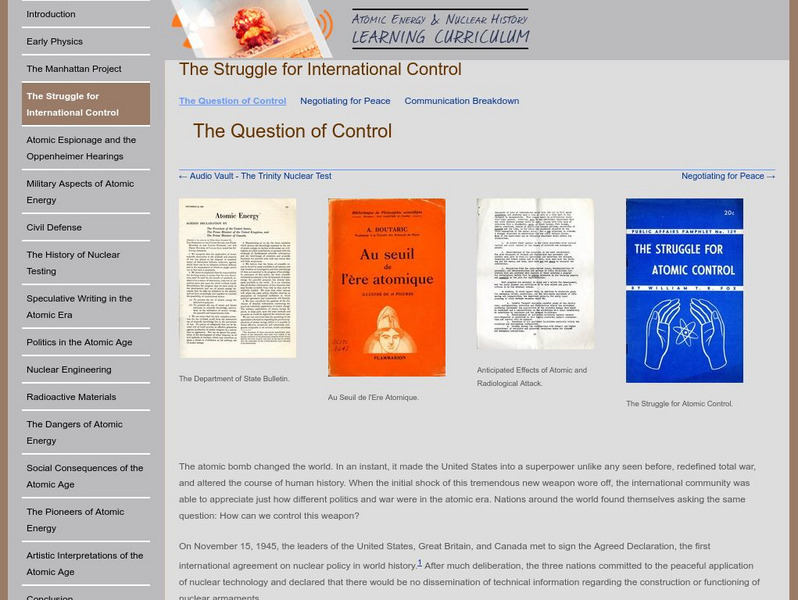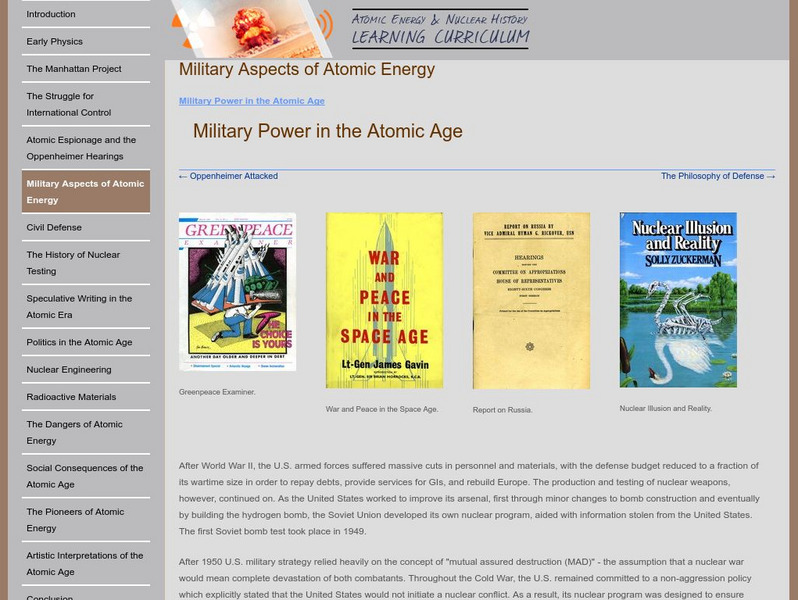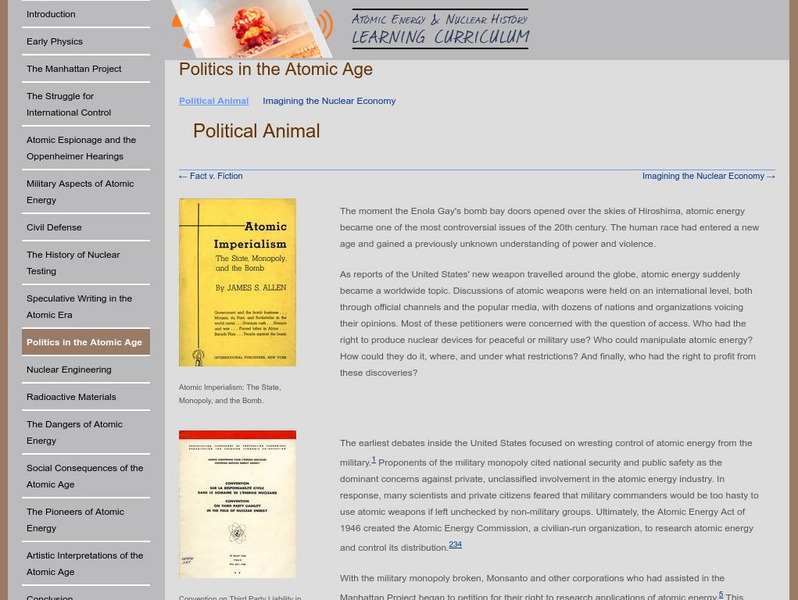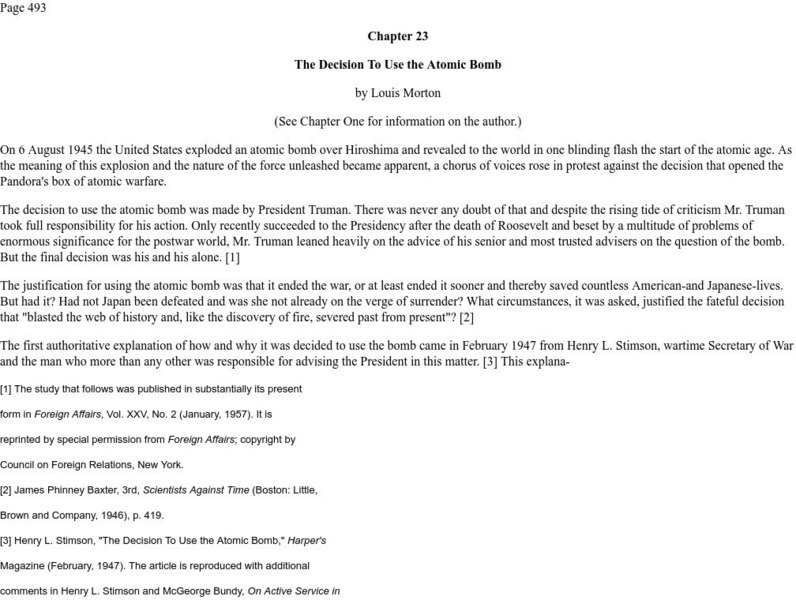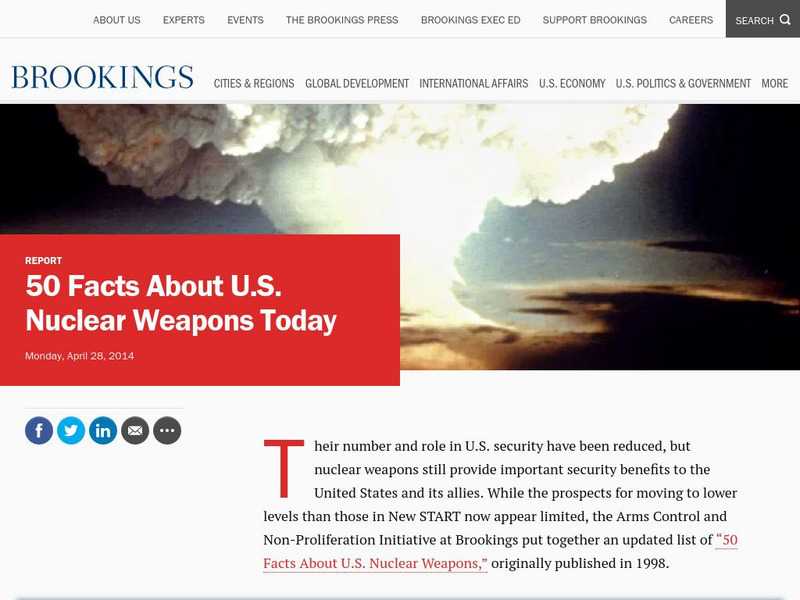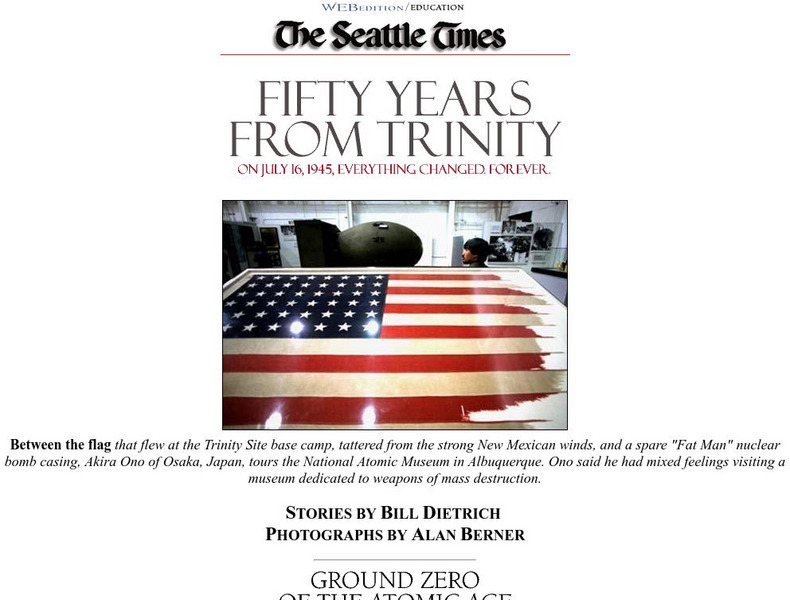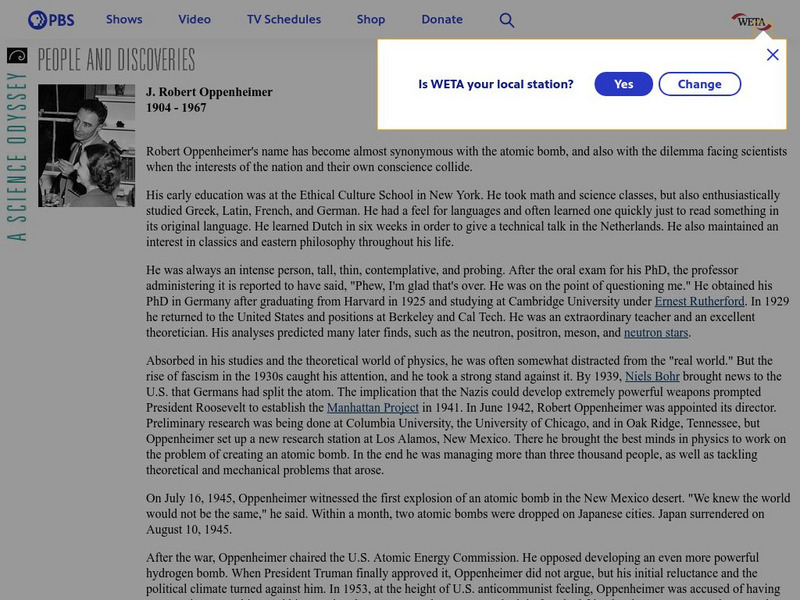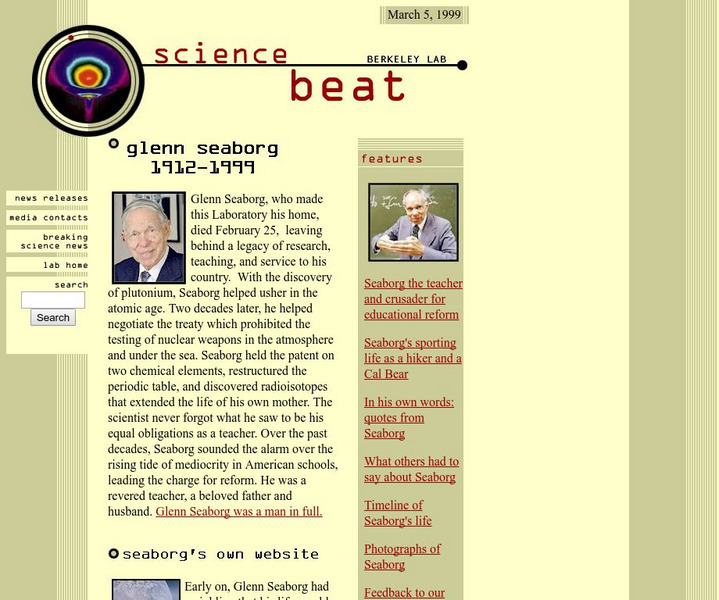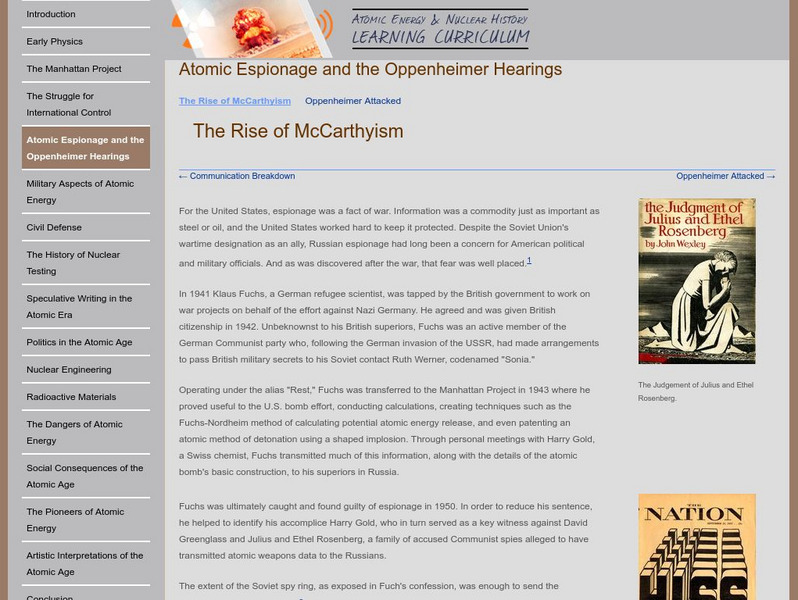US National Archives
Our Documents: A National Initiative on American History, Civics, and Service
Our Documents is home to one hundred milestone documents that influenced that course of American history and American democracy. Includes full-page scans of each document, transcriptions, background information on their significance, and...
Digital History
Digital History: The Decision to Drop the Bomb [Pdf]
The day before the bombing of Pearl Harbor, President Franklin Roosevelt gave the go-ahead to scientists to develop an atomic bomb. This site gives a good overview of the war in the Pacific against Japan, the increasing successes of the...
Oregon State University
Oregon State University: Atomic Energy and Nuclear History
Exhibit from Oregon State University Library on Atomic Energy and the Struggle for International Control.
Oregon State University
Oregon State University: Military Aspects of Atomic Energy: Military Power
Article describes military power in an atomic age and perception at home and abroad during the 1950s.
Oregon State University
Oregon State University: Politics in the Atomic Age
Oregon State online exhibit on Atomic Energy and Nuclear History features discussion and primary source material on the politics of the Atomic Age, citizen reaction and the Atomic Energy Act of 1946.
PBS
Pbs American Experience: Race for the Superbomb
This site explores the Cold War race to develop the hydrogen bomb, a weapon that would change the world. Content details all the people who were involved in the race for the H-Bomb, as well as notable events during this time period....
US Army Center
U.s. Army Center of Military History: The Decision to Use the Atomic Bomb
In-depth analysis of the decision to create and drop the atomic bomb on Japan during World War II. Includes details on the Interim Committee.
PBS
Pbs: The War: The Atomic Bomb
At the online companion site of the PBS documentary series "THE WAR," read three descriptions of the atomic bomb and its use.
PBS
Pbs: People & Discoveries Niels Bohr
A wonderful PBS biography of a great man. This contains many personal touches, yet does a fine job of describing Bohr's scientific work. But it's best at Bohr the man. Nice quotes, one in the middle, one at the end.
Flow of History
Flow of History: Nuclear Arms Race
The events and countries involved in the nuclear arms race are profiled. Text plus a colored graphic flowchart make the topic visually appealing and of interest to both students and educators.
Other
Hiroshima & Nagasaki 60 Years Later
Detailed background information and a collection of resources are provided to help one understand the history of the bombings of Hiroshima & Nagasaki. Material consists of original texts, eyewitness accounts, photographs, videos, and...
Other
Brookings Institution: 50 Facts About u.s. Nuclear Weapons
A page provided by the Brookings Institution which lists 50 "facts" about U.S. Nuclear Weapons. Good place to start for basic (and sometimes interesting) statistics. (Published April 28, 2014)
Other
Seattle Times: Fifty Years From Trinity
This article from the Seattle Times describes the dawning of the atomic age. Illustrates the events of the detonation of the first atomic bomb in Trinity, New Mexico, just before the Hiroshima bomb.
Other
Seattle Times: Fifty Year From Trinity
Outstanding, very readable website that includes major sections on Trinity, Nevada Test Site, and Hanford (where plutonium for original bomb was made). Contains links to other related websites.
PBS
Pbs: American Experience: The Trials of J. Robert Oppenheimer
J. Robert Oppenheimer is credited with the creation of the atomic bomb. But, "The country asked him to do something and he did it brilliantly, and they repaid him for the tremendous job he did by breaking him." This documentary traces...
OpenStax
Open Stax: World War Ii 1941 1945: The Pacific Theater and the Atomic Bomb
Looks at America's involvement in the Pacific Campaign, and the decision to use the atomic bomb against Japan and the impact it had.
Other
Los Alamos Bradbury Science Museum: Us Dept of Energy
This museum site takes the visitor on an inside track of the Los Alamos Laboratory. Find out more about the mission of the laboratory when you visit this site.
TED Talks
Ted: Ted Ed: Why Doesn't Anything Stick to Teflon?
Teflon was in the spacesuits the Apollo crew wore for the moon landing, in pipes and valves used in the Manhattan project, and it may be in your kitchen, as the nonstick coating on frying pans and cookie sheets. So what is this slippery...
PBS
Pbs: J. Robert Oppenheimer 1904 1967
This site from PBS provides biographical information about J. Robert Oppenheimer, and his involvement with the atomic bomb.
University of Minnesota
Univ. Of Minnesota: War Department Release on New Mexico Test, July 16, 1945
Originally published on July 16, 1945, this is a dramatic account of the government's testing of their latest, most powerful weapon, the atomic bomb. Describes the emotions of scientists and war officials before, during and after...
Lawrence Berkeley National Laboratory
Berkeley Lab: Science Beat: Glenn Seaborg
A very interesting site about Seaborg. It contains quotes from him and about him, photographs, and a timeline.
Oregon State University
Osu: Atomic Espionage and the Oppenheimer Hearings
Atomic Energy and Nuclear History Online exhibit from Oregon State University Library features information on Atomic Espionage and the Oppenheimer Hearings.
Wikimedia
Wikipedia: J. Robert Oppenheimer
This biography from the encyclopedia Wikipedia of physicist Robert Oppenheimer discusses his education, his creation of the atomic bomb, and later, his opposition to the use of the bomb.
National Cable Satellite Corporation
C Span Classroom: World War Ii the Decision to Use the Atomic Bomb
This video provides Lt. Col. Grant Weller, who describes the decision of the United States to use the atomic bomb on Japan to end World War II. Student questions are provided to assess their understanding of the information.


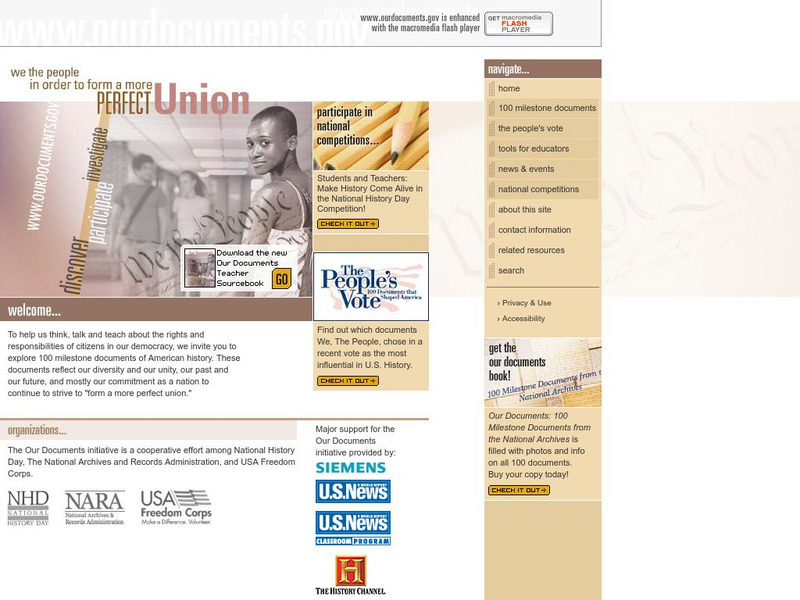
![Digital History: The Decision to Drop the Bomb [Pdf] Website Digital History: The Decision to Drop the Bomb [Pdf] Website](https://d15y2dacu3jp90.cloudfront.net/images/attachment_defaults/resource/large/FPO-knovation.png)
